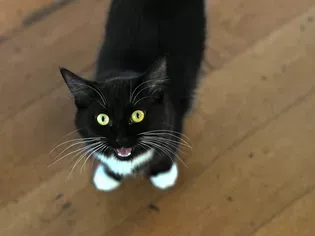Reasons Why Your Cat Meows at Night
Updated on 05/27/24

Unveiling the Nocturnal Chorus: Why Your Cat Meows at Night
As the moon casts an ethereal glow upon the slumbering world, your feline companion may embark on a nocturnal serenade, filling the night with its piercing meows. While these midnight vocals can be endearing, they can also disrupt your sleep and leave you wondering why your furry friend is so vocal after dark.
Understanding the Causes of Nighttime Meows
Decoding your cat's nighttime meows can help you address their underlying needs and restore tranquility to your abode. Here are some common reasons why cats meow at night:
1. Hunger and Thirst
Like humans, cats require nourishment throughout the day. If your cat's dinner hour is late or its water bowl is empty, it may resort to meowing to signal its hunger or thirst.
Example: Your cat may meow persistently at the kitchen door or near its empty water bowl.
2. Loneliness and Boredom
Cats are social creatures that crave attention and interaction. If your cat feels lonely or bored, it may meow to get your attention or signal that it wants to play.
Example: Your cat may rub against your legs or jump on your lap while meowing.
3. Nighttime Hunting Instincts
Cats are natural predators that retain their hunting instincts even as domesticated pets. At night, when their senses are heightened, they may meow to alert you to prey or mimic the cries of their potential quarry.
Example: Your cat may meow while looking out a window or listening to noises outside.
4. Medical Conditions
Persistent nighttime meowing can sometimes be a sign of underlying medical conditions, such as pain, arthritis, or cognitive disorders. If your cat is exhibiting other symptoms, such as lethargy, changes in appetite, or difficulty moving, consult your veterinarian promptly.
Example: Your cat may meow excessively while walking or jumping.
5. Anxiety and Stress
Cats are sensitive to changes in their environment and can experience anxiety or stress in response to various factors, including moving, new pets, or changes in routine. Nighttime meowing can be a way for them to express their distress.
Example: Your cat may meow incessantly after a recent move or the introduction of a new pet.
6. Attention-Seeking Behavior
Some cats learn that meowing at night can get them what they want, such as treats, playtime, or your presence. If you consistently respond to your cat's nighttime meows, it may reinforce this attention-seeking behavior.
Example: Your cat may meow at your bedroom door until you let it in.
Addressing Nighttime Meows Effectively
Once you understand the underlying cause of your cat's nighttime meowing, you can take steps to address it effectively:
1. Rule Out Medical Issues
If you suspect your cat's nighttime meows may be a sign of a medical condition, consult your veterinarian for a thorough examination and diagnosis.
2. Adjust Feeding and Water Schedule
Ensure your cat has access to fresh food and water throughout the night. Consider using an automatic feeder or water fountain to replenish their supplies while you sleep.
3. Provide Enrichment and Companionship
Keep your cat mentally and physically stimulated during the day with interactive toys, play sessions, and scratching posts. Consider adopting a companion cat to provide companionship and reduce boredom.
4. Create a Calm and Quiet Environment
Make sure your cat's environment is free from stressors and provides a sense of security. Use calming diffusers, play soothing music, or provide hiding places to reduce anxiety and promote a restful sleep.
5. Establish Clear Boundaries
If your cat's nighttime meowing is attention-seeking behavior, it's essential to establish clear boundaries. Avoid responding to meows during the night and ignore them until morning.
6. Consult a Veterinary Behaviorist
If you're unable to resolve your cat's nighttime meowing on your own, consider consulting a veterinary behaviorist. They can provide specialized advice and assist you in developing an effective behavior modification plan.
Conclusion
While nighttime meows can be a source of frustration, understanding their underlying causes and implementing effective solutions can help restore harmony to your feline-human relationship. By addressing your cat's needs, providing enrichment, and creating a calming environment, you can ensure that both you and your furry companion enjoy a peaceful and restful night's slumber.
Explore More Pets

Cat Behavior Problems
How to Stop Aggression in Kittens

Long-Haired Cat Breeds
Siberian Cat: Breed Profile, Characteristics, & Care

Cat Behavior Problems
How to Stop Kittens From Scratching and Biting

Long-Haired Cat Breeds
Turkish Angora: Cat Breed Profile, Characteristics & Care

Basic Training
How to Socialize Your Kitten

Short-Haired Cat Breeds
Cute Pictures & Facts About Calico Cats & Kittens

Litter Box Training
Training Your Kitten to Use the Litter Box

Long-Haired Cat Breeds
10 Fun Facts About White Cats
